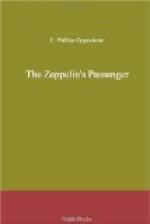“If I can be of any service,” Lessingham murmured.
“Precisely,” the other interrupted. “I knew you would feel like that. Now your arrival here—we have the date, I think—October 6th. As you have just remarked, you didn’t come by train. How did you come?”
Lessingham’s surprise was apparently quite genuine.
“Is that a question which you ask me to answer—officially?” he enquired.
His interlocutor shrugged his shoulders.
“I am not putting official questions to you at all,” he replied, “nor am I cross-examining you, as might be my duty, under the circumstances, simply because your friendship with the Cranstons is, of course, a guarantee as to your position. But on the other hand, I think it would be reasonable if you were to answer my question.”
Lessingham nodded.
“Perhaps you are right,” he admitted. “As you can tell by finding me here this afternoon, I am a great walker. I arrived—on foot.”
“I see,” Griffiths reflected. “The other question which we usually ask is, where was your last stopping place?”
“Stopping place?” Lessingham murmured.
“Yes, where did you sleep the night before you came here?” Griffiths persisted.
Lessingham shook his head as though oppressed by some distasteful memory.
“But I did not sleep at all,” he complained. “It was one of the worst nights which I have ever spent in my life.”
Captain Griffiths gathered up his reins.
“Well,” he said with clumsy sarcasm, “I am much obliged to you, Mr. Lessingham, for the straight-forward way in which you have answered my questions. I won’t bother you any more just at present. Shall I see you to-morrow night at Mainsail Haul?”
“Lady Cranston has asked me to dine,” was the somewhat reserved reply.
His inquisitor nodded and cantered away. Lessingham looked after him until he had disappeared, then he turned his face towards Dreymarsh and walked steadily into the lowering afternoon. Twilight was falling as he reached Mainsail Haul, where he found Philippa entertaining some callers, to whom she promptly introduced him. Lessingham gathered, almost in the first few minutes, that his presence in Dreymarsh was becoming a subject of comment.
“My husband has played bridge with you at the club, I think,” a lady by whose side he found himself observed. “You perhaps didn’t hear my name—Mrs. Johnson?”
“I congratulate you upon your husband,” Lessingham replied. “I remember him perfectly well because he kept his temper when I revoked.”
“Dear me!” she exclaimed. “He must have taken a fancy to you, then. As a rule, they rather complain about him at bridge.”
“I formed the impression,” Lessingham continued, “that he was rather a better player than the majority of the performers there.”
Mrs. Johnson, who was a dark and somewhat forbidding-looking lady, smiled.




